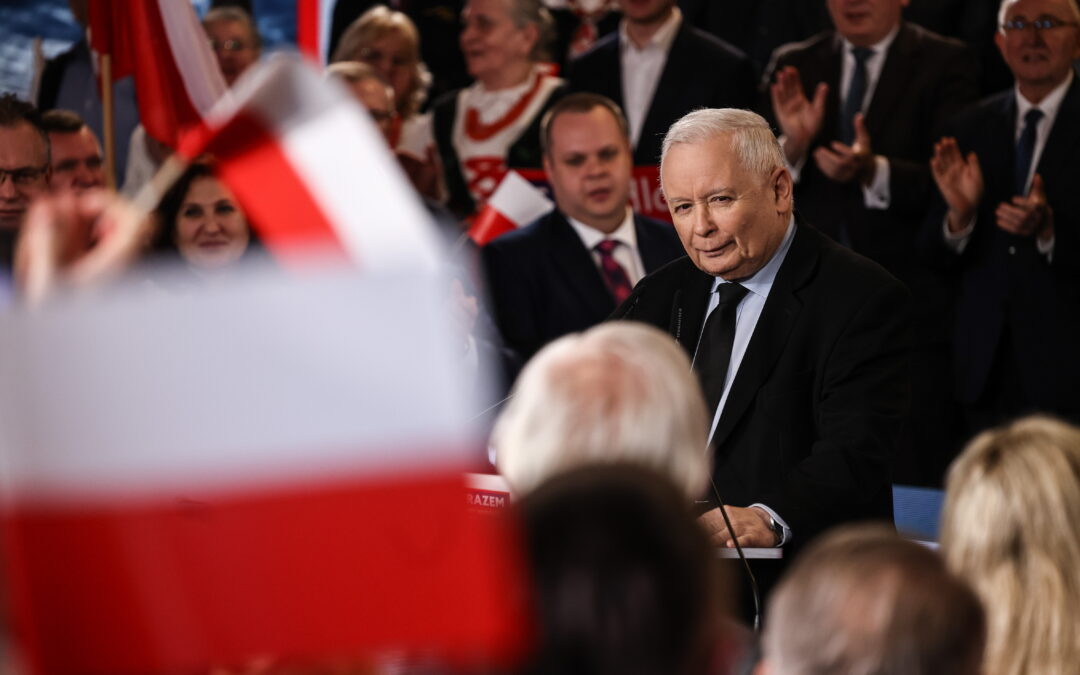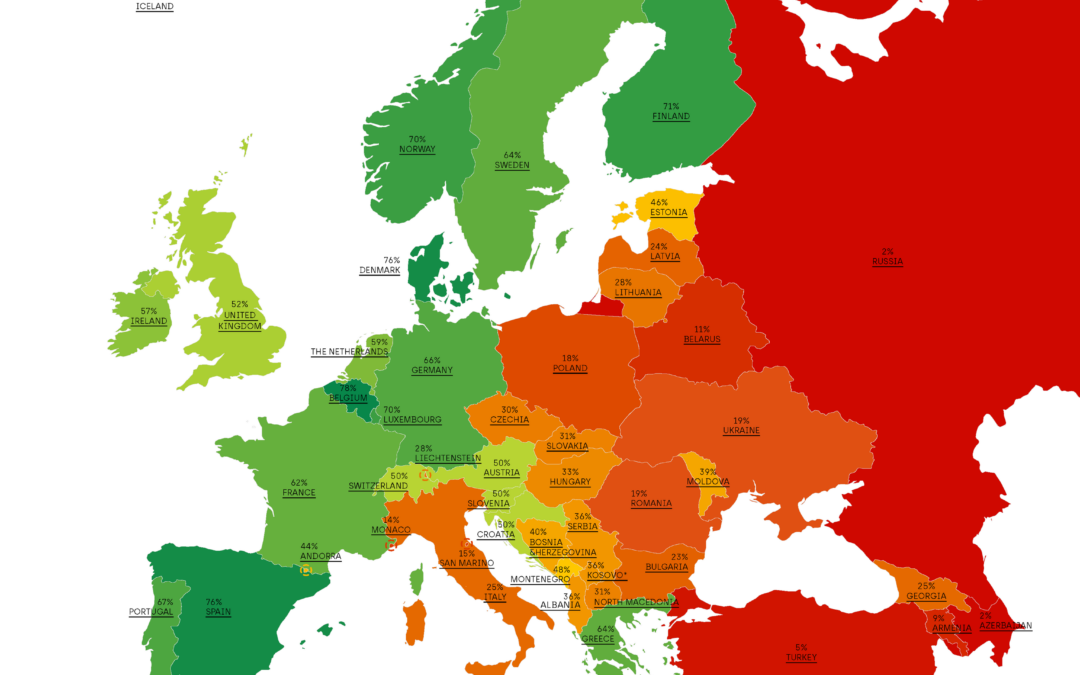By Aleks Szczerbiak
Poland’s right-wing opposition party defied predictions and secured the largest number of votes in regional authority elections, the key barometer of national support.
Nonetheless, in spite of internal divisions over the abortion issue and concerns that it is prioritising settling scores with its predecessor over delivering on its election promises, the ruling coalition secured roughly the same vote share as in last October’s parliamentary election.
First electoral test since last October
Last December, a new coalition government led by Donald Tusk, who had served as Polish prime minister between 2007-14 and then European Council President from 2014-19, was sworn in, ending the eight-year rule of the right-wing Law and Justice (PiS) party.
Tusk is leader of the liberal-centrist Civic Platform (PO) which once again became the country’s main governing party.
The new coalition also includes the eclectic Third Way (Trzecia Droga) alliance – which itself comprises the agrarian-centrist Polish People’s Party (PSL) and the liberal-centrist Poland 2050 (Polska 2050) grouping formed to capitalise on TV-personality-turned-politician Szymon Hołownia’s strong third place in the 2020 presidential election – and the smaller New Left (Nowa Lewica) party, the main component of a broader Left (Lewica) electoral alliance.
Poland's new government is a diverse coalition ranging from left to centre-right and contains a mix of big names and new faces, including some from outside politics.
Read our profile of every minister and some of the challenges each will face ⬇️ https://t.co/J1xfrmHHdj
— Notes from Poland 🇵🇱 (@notesfrompoland) December 13, 2023
As well as electing thousands of councillors and local mayors, April’s local elections were the first major test of party support since last October’s parliamentary election.
Local elections are so-called “second order” elections and, when these are held shortly after parliamentary polls, one would expect to see newly elected governing parties do well because they are still enjoying a post-election honeymoon, while the losing parties’ demoralised supporters are much less likely to vote.
Sure enough, from the beginning of January most polls showed that, for the first time in years, PO had overtaken PiS. At the same time, the former ruling party was plagued by infighting and struggled to develop an effective opposition strategy, spending too much time on issues that consolidated its most loyal hardcore supporters rather than broadening its appeal.
Local elections this Sunday will be the first major test of public opinion since last year's change of government.
The ruling coalition is showing signs of division while the opposition PiS party is seeking to reverse its decline, writes @AleksSzczerbiak https://t.co/MAyunSRS18
— Notes from Poland 🇵🇱 (@notesfrompoland) April 2, 2024
Local elections have always been a tough challenge for PiS because much of the media focus goes on the high-profile mayoral contests in Poland’s major urban centres, which are liberal-left strongholds.
In fact, as the only local government tier contested mainly on party lines, the aggregated vote share in elections to the 16 regional assemblies is the key barometer of national support. Poland’s regional assemblies also play an important role in managing and distributing EU funds and are a key source of local party patronage.
PiS defies expectations
In the event, PiS defied predictions that its vote share would collapse and actually came in first in the regional poll with 34.3% nationwide, ahead of PO on 30.6%, as well as securing the largest vote share in seven out of the 16 regional assemblies.
The result was thus a major success for PiS, both politically and psychologically, allowing its leader Jarosław Kaczyński to silence his internal party critics and claim that the party had rebounded from its post-election dip.
It sent a powerful signal that Poland remained deeply divided politically and that PiS remained a formidable challenger to the coalition government.
Official results from yesterday's local elections have been announced.
PiS, the main national opposition party, won the highest overall share of the vote (34%) but Prime Minister Donald Tusk's KO emerged as the largest group in most provincial parliaments https://t.co/1WITwHupHF
— Notes from Poland 🇵🇱 (@notesfrompoland) April 8, 2024
For its part, in a major setback to Tusk’s ambitions to cement his grip on power, PO was bitterly disappointed that it failed to overtake PiS.
Emboldened by strong polling at the beginning of the year, in January PO rejected the idea of standing a joint candidates list with The Left for the regional assemblies, no doubt confident that it could defeat PiS single-handedly.
The Third Way scored 14.3%, which was roughly what it secured last October (14.4%) but had hoped to cash in on Hołownia’s popularity in the high-profile post of speaker of the Sejm, Poland’s more powerful lower parliamentary chamber, where he has often used his experience as a TV presenter to create a humorous and engaging spectacle (dubbed “Sejmflix”).
The most disappointing result, however, was for The Left, which had expectations of securing a good double-digit result but only won 6.3%, less than the disappointing 8.6% that it obtained last October.
Governing party voters stayed at home?
Some commentators explain the outcome through much lower turnout among supporters of the governing parties. For sure, at 52%, turnout was significantly below last October’s record 74% and even down three points on the 55% in the previous 2018 local elections.
However, the context in which these elections were held was very different to the emotionally charged and highly polarised parliamentary campaign, and even the previous local polls took place at the beginning of the electoral cycle leading up to the 2019 legislative vote.
This time around, many voters were exhausted and simply “switched off” from politics. Moreover, turnout is always much lower in local than parliamentary elections, and this was actually the second highest recorded in any post-1989 local government poll.
Nonetheless, average turnout was certainly somewhat higher in PiS’s strongholds in southern and eastern Poland than areas where the governing parties enjoyed greater support.
"Reports of my death are greatly exaggerated," said Jarosław Kaczyński, after exit polls indicated his opposition PiS party won the most votes in yesterday's local election
PM Donald Tusk admitted that his KO group "failed in the east and the countryside" https://t.co/Umqx6EQFw3
— Notes from Poland 🇵🇱 (@notesfrompoland) April 8, 2024
There was also much lower turnout among some of the demographic groups that voted heavily for the new governing parties last October.
For example, among the youngest voters, it fell from 69.9% to 38.6%, while PiS moved from fifth to second place in this demographic with its vote share increasing from 14.9% to 21.6% – although this should not be exaggerated as there are many more middle-aged and older voters in Poland than younger ones.
Divisions over abortion
The local elections took place at a time when the first serious divisions were starting to emerge among the governing camp’s ideologically heterogeneous coalition partners, particularly the Third Way and The Left.
Much of this focused on the highly contentious issue of abortion, which led to a major row that undermined the show of unity that facilitated last October’s election victory.
The left and centre-right wings of the ruling coalition have clashed over the speaker of parliament's decision to delay bills that would end Poland's near-total abortion ban.
He says they should not be debated amid the campaign for April's local elections https://t.co/GAv3YWrvwG
— Notes from Poland 🇵🇱 (@notesfrompoland) March 6, 2024
Many commentators felt that the huge protests against the Polish Constitutional Tribunal’s October 2020 ruling that abortions on the grounds of serious and irreversible birth defects are unconstitutional was a key turning point in the previous PiS government’s slump in support from which it never really recovered and which culminated in its election defeat.
As a consequence, the abortion issue has assumed huge symbolic importance for many of the new government’s supporters, who hoped that it would introduce legislative changes to expand access to it.
However, although there is broad consensus within the ruling coalition that the tribunal’s ruling should be reversed, it is very divided on what precise form that should take.
A new phase of confrontation began when Hołownia announced that parliamentary work on legislation aimed at liberalising the abortion law would not begin until after the first round of local election voting.
His announcement was met with anger from The Left which claimed that he was delaying the debate because some Third Way election candidates, especially those standing for the Polish People’s Party, were afraid of offending local parish priests, who remain influential civil society actors in smaller towns and rural areas.
Parliament has voted for bills aimed at ending Poland's near-total abortion ban to proceed to for further legislative work.
However, they still face a number of hurdles, including differences within the ruling coalition over how far to liberalise the law https://t.co/IIcMnvk0jZ
— Notes from Poland 🇵🇱 (@notesfrompoland) April 12, 2024
The fact that there were raised expectations on this issue undoubtedly contributed to disillusionment among some of those who voted for the governing parties last October.
However, much of the political damage came from the fact that, by delaying the parliamentary vote for apparent electoral advantage, Hołownia appeared to be using his position as Sejm speaker as an “old school” politician to further his own grouping’s interests. At the same time, The Left failed to derive any electoral benefit from making abortion the centrepiece of its local election campaign.
Broken promises and looking backwards
Another factor was the perception that the governing coalition was failing to deliver on its election promises; prominent among which was, of course, the speedy liberalisation of the abortion law.
PO had pledged to implement 100 reforms in its first 100 days in office, which fell in the middle of the local election campaign, but only delivered on a very small proportion (most commentators estimated around one in ten), postponing, for example, the introduction of its high profile pledge to increase the annual tax-fee income threshold to 60,000 złoties.
The governing parties’ excuses – that they had to compromise because they were part of a ruling coalition, or that their promises were not to be taken literally – were unconvincing.
Poland’s main opposition has unveiled 100 policies for its first 100 days in office if it wins power
They include doubling the tax-free income threshold, making abortion "legal, safe and available", raising public-sector pay and abolishing the Church Fund https://t.co/eXAXUtNfdA
— Notes from Poland 🇵🇱 (@notesfrompoland) September 11, 2023
This coincided with the fact that voters appeared to be rapidly losing interest in the new government’s so-called “reckoning” (in Polish: rozliczenie) with its PiS predecessor’s alleged abuses of power.
In particular, the three high-profile special parliamentary investigative commissions that the government set up have failed to develop much traction. Poles want their governments to be forward-looking and even among voters supportive of this process of settling of accounts there is an increasing perception that the government needs to offer a more positive policy agenda.
Trzaskowski set for presidential challenge
However, the local election results also suggest that the Polish political landscape has not actually changed very much during the last six months.
For sure, while PO did not manage to secure first place independently of its governing partners, the three groupings that make up the ruling coalition still secured 51% of the regional vote (compared with 54% last October). PO came first in nine of the 16 regional authorities and, along with its allies, is very likely to secure control of eleven of them.
Tusk’s party also celebrated the fact that it dominated the mayoral elections in larger towns and cities. The most significant of these from a national perspective was the Warsaw mayoral race, where PO-backed incumbent Rafał Trzaskowski, who narrowly lost the 2020 Polish presidential election, won a decisive first-round victory with 57.4% of the votes, bolstering his position as the party’s most likely candidate in the 2025 presidential race.
The first official results from local elections have begun to emerge.
In Warsaw, mayor @trzaskowski_ has won a second term with 57.4%. Incumbents also won in Gdańsk and Łódź.
However, Kraków, Wrocław and Poznań will need run-off votes in two weeks https://t.co/wPAcviw2IJ
— Notes from Poland 🇵🇱 (@notesfrompoland) April 8, 2024
Although Tusk made great play of Trzaskowski’s victory, this was actually a bittersweet result for the prime minister, who some commentators say has his own presidential ambitions; he would probably have preferred the incumbent being forced into a second-round run-off
Nonetheless, although PiS is certainly not out of the woods and lost control of three regional councils compared with 2018, by retaining power in at least four where it has an outright majority – and possibly a fifth (Podlasie) where the balance is held by a councillor from the radical right free-market Confederation (Konfederacja) grouping – the party exceeded expectations that it would do very well to regain control of even three.
European Parliament election expectations shift in PO’s favour?
The local elections served as a prelude to the June European Parliament election campaign, which began seamlessly after the council results were announced.
While the local polls appeared to leave PiS well positioned, European elections have traditionally been very difficult ones for the party because turnout has generally been very low overall (between 2004-14 it ranged from 21-25%) but higher among better-off, urban voters who tend to support the liberal-centrist and left-wing parties.
In fact, in the previous 2019 European election, PiS actually secured its best-ever result in any election (45%) but was able to mobilise its supporters by treating the poll as a prelude to the parliamentary election held later that year, reflected in the 46% turnout level.
This will be very difficult to repeat because the June European election is much more likely to play out as a classic “second order” poll. Ironically, the fact that PiS did so surprisingly well in the local elections has also shifted expectations, making it the frontrunner, which should actually work in PO’s favour.
Opposition party PiS has pledged to oppose the EU's Green Deal in a bid to win votes ahead of the EU election.
The promise has been met with scepticism, with some pointing out the set of EU climate policies was approved by Warsaw when PiS was in powerhttps://t.co/Dbl2QhaB1y
— Notes from Poland 🇵🇱 (@notesfrompoland) April 29, 2024

Notes from Poland is run by a small editorial team and published by an independent, non-profit foundation that is funded through donations from our readers. We cannot do what we do without your support.
Main image credit: Jakub Wlodek / Agencja Wyborcza.pl




















